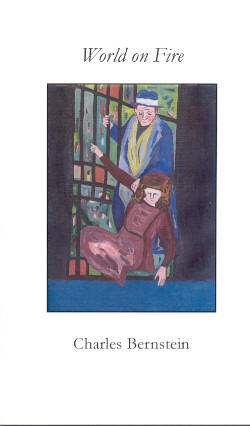From Ron Silliman's blog February 11, 2004
Ask any reader familiar with contemporary U.S. poetry which writer might be most likely to appropriate the title of the tune “ChoCho Ch’Boogie” for a poem that would include the following lines –
The rink around the
posing is closed for retrofitting.
Refurbishment
is just around the hospital coroner.
– & a substantially decent percentage would point directly & correctly to Charles Bernstein as the most likely culprit. And right they would be. No other poet in my generation – Bernstein is five years younger, but reading him brings out the boy in me – has a more instantly identifiable style, one part shtick, one part brooding (but giggly) social analysis.
Bernstein’s flare is evident everywhere in World on Fire, a slim but significant chapbook published by Meredith Quartermain’s Nomados Press of Vancouver. In a reading in the garden at Kelly Writers House last September, Bernstein indicated that these eleven poems – every one of which can be heard & downloaded from [PennSound] – were conceived in fact as a sequence. Given the title & Bernstein’s lifelong devotion to the isle of his birth, Manhattan, one might read this as his response to the events of September 11 & possibly it is. Unlike, say, Michael Gottlieb’s “The Dust,” however, World on Fire can’t be filtered via close reading the way human remains might be sifted from the debris that now populates the Fresh Kills* landfill site on Staten Island.
Maybe it is, but if so, Bernstein’s not letting on. Indirection is almost a religious principle in his work. Yet, in fact, these works, which so often are composed out of found language & devolved ad slogans –
It’s still the same old lorry.
Astronaut
meets Mini-Me in a test tube in Rome,
Regis spurns Veronica, Merv buys casino,
goes to another season, but in the
previous year
– and which are so easily taken by casual, if not outright careless, readers as if they were a literary Rorschach, seem to resolve inescapably to schematic frames that signal the autumn of 2001.
Here is the whole of “Ghost of a Chance”:
The silent ending came as fast as the
cold click of a Berreta. In those years,
before the war, it was the custom. An
entry point could always be found – a ways
down the road, hidden by the side of a
steel-gray tool shed, or in warehouses near
the waterfront. The days always went like
that. And if the money was in the wrong
horse race at least it would be kept quiet,
for a while. The perfume smell was all but
unendurable, when the door opened
and the room flooded with neon and ice-
cold air. Behind the camera the men
joked about the almost bitter coffee.
At one level this reads not unlike a lyric as abstract as anything John Ashbery ever crafted. Yet that is only one level & what rises up from Bernstein’s bleaker humor is an infinitely darker vision. In fact, Ashbery isn’t the right point of comparison for Bernstein’s work – he never really has been. The poet among the New Americans who is closest to Bernstein, as a writer, scene maker & in terms of personal vision, is Allen Ginsberg.
I remember once a couple of decades ago going to hear Allen in some large auditorium setting. Although Ginsberg did read ”Howl” almost as an encore that night, his focus was on the then-most-recent short sharp satirical lyrics, often accompanying himself on the harmonium. My own feeling at the time was some sort of radical despair – the creator of some of the most majestic & perceptively detailed poems of the past 50 years – not just “Howl,” but even more so “Wichita Vortex Sutra” – appeared to have been swallowed alive by a comic clown, performing agitprop with the tones of a mantra. Whom bomb indeed!
Later, tho, I found myself rereading the works I’d come to love in Ginsberg & increasingly recognizing that the same satirical impulse – which is a profoundly political stance – lurked just beneath the surface, even in “Sutra” & “Howl.” If anything, Ginsberg was increasingly becoming himself as he wrote, worrying less & less about “would this work be accepted” than he had in his anxious early years. Kaddish has always struck me as an exceptionally anxious book, for example – Ginsberg there is trying (not successfully, actually) to find a middle ground between the satiric commentator & the more orphic Whitmanesque bard who had suddenly become internationally famous. As time evolved, tho, the either/or problem more or less dissolved. Ginsberg was free to be what he wanted & it’s interesting to see what he chose.
Bernstein’s book looks like a simple enough chapbook of witty lyrics, complete with the signature Susan Bee painting on the cover**. Yet underneath the wry twists, the noir humor, this is in fact a deeply politicized response to the defining event of his city. As the poem “Broken English” asks five separate times in its 27 lines, What are you fighting for?
It’s not a joke.
* Bizarre as that name might seem as the repository for debris from the World Trade Center attack, the word kills means river in Dutch.
** Seemingly a man & woman at a window, contemplating whether or not to jump. |
